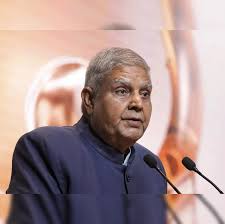Flutter in Delhi as V-P Dhankhar quits on Day 1 of monsoon session, two years left in his term

Vice President Jagdeep Dhankhar shocked Parliament and the nation by resigning on the first day of the Monsoon Session. He cited health concerns as the reason behind his abrupt exit, which came with two years still left in his term.
Unexpected Move on a Critical Day
Dhankhar submitted his resignation to President Droupadi Murmu under Article 67(a) of the Constitution. The timing raised eyebrows, as he had chaired the Rajya Sabha that same morning. His office had also confirmed a public event in Jaipur scheduled for the next day.
The Vice President said doctors had advised him to step back due to ongoing health issues. He recently underwent a cardiac procedure in March but continued official duties without pause.
Opposition Questions the Timing
While Dhankhar thanked the President, Prime Minister Narendra Modi, and Parliament in his letter, opposition leaders weren’t fully convinced. Many called the resignation “sudden” and “unusual.” Some suggested political reasons might lie behind the move.
A senior Congress leader said, “This is shocking. The timing seems off.” Other parties like the TMC and CPI(M) echoed similar doubts. They questioned whether internal friction within the NDA or pressure from recent events contributed to the decision.
An Active and Controversial Tenure
Dhankhar became Vice President in August 2022. He had earlier served as Governor of West Bengal, where he often clashed with the state government. His style was bold, and he didn’t shy away from conflict in Parliament either.
In the Rajya Sabha, he made headlines for sharp comments and interventions. He regularly emphasized legislative supremacy, sometimes challenging the judiciary’s role. Supporters praised his firm grip on procedure. Critics, however, saw it as overreach.
What Comes Next?
Now that Dhankhar has stepped down, the race to find his replacement has begun. The Vice President is elected by MPs from both Lok Sabha and Rajya Sabha. Given the political climate, the selection will likely see intense lobbying and strategic alliances.
Until a new Vice President is elected, Deputy Chairman Harivansh Narayan Singh may handle Rajya Sabha proceedings. The Constitution doesn’t offer a formal “acting Vice President” role, so the process must move swiftly.
Political Reactions and Theories
Opposition leaders pointed to several recent events that might explain Dhankhar’s exit. These include debates on the Delhi Services Bill, rising executive-judiciary tensions, and friction over controversial laws.
Some also recalled a public video where Dhankhar said he would only leave office in 2027, barring “divine intervention.” That clip resurfaced online and added to the speculation.
A few political analysts believe Dhankhar may have disagreed with internal government decisions or pressure from key allies. Others think health could genuinely be the reason, as his March procedure was significant.
Public and Media Response
Social media users reacted with shock, concern, and questions. Hashtags like #DhankharResigns and #VPExit trended on X (formerly Twitter). Some posted tributes, while others hinted at political drama.
Mainstream media outlets ran continuous coverage, interviewing political experts and former Rajya Sabha officials. Many wondered if the resignation would impact upcoming legislation or 2026 political alignments.
Legacy and Impact
Dhankhar’s exit leaves a mixed legacy. He was bold, assertive, and active in shaping how the Rajya Sabha functioned. At times, his style drew applause. At others, it triggered sharp opposition.
He often challenged the judiciary’s influence and pushed for more power to remain with elected representatives. Whether one agreed or disagreed with him, he brought visibility to the Vice President’s office.
Conclusion: A Turning Point in Delhi
Jagdeep Dhankhar’s sudden resignation has disrupted the rhythm of Parliament. It adds a layer of uncertainty to an already heated political environment. With key bills pending and elections approaching, the timing couldn’t be more critical.
While the official reason cites health, the political world remains curious. The coming days will reveal whether this was just a personal decision—or the start of deeper shifts in the Indian political landscape.






